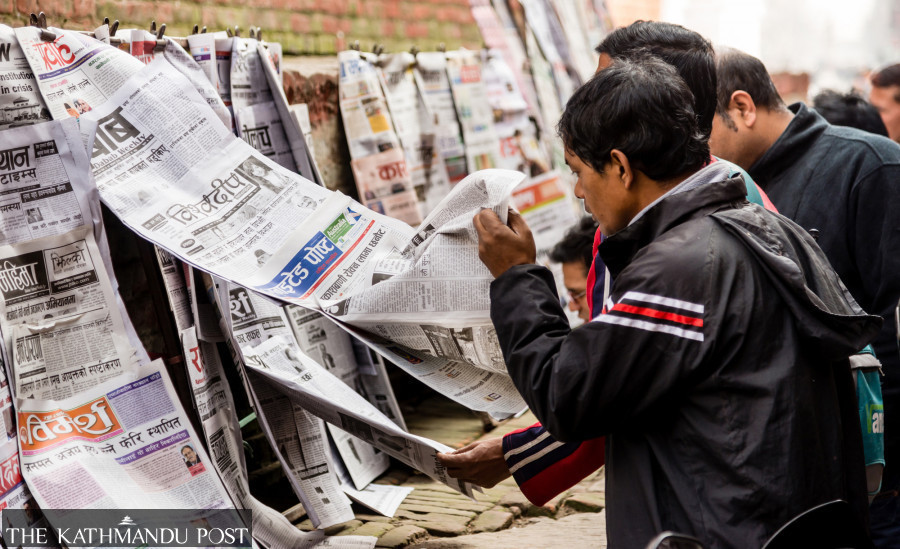Columns
Fading fourth estate
While Nepal’s press freedom ranking indicates progress, the dwindling credibility of the FNJ suggests otherwise.
Bhanu Bhakta Acharya
Nepal has made notable progress in press freedom internationally, ranking 74th in the 2024 World Press Freedom Index. According to Reporters Sans Frontières (RSF), a global media watchdog, Nepal has outperformed other South Asian nations in political, economic, legislative and social indicators. This suggests a more hospitable environment for journalists and media professionals than its neighbours. The remaining South Asian countries, as noted by RSF, face serious challenges to media freedom, particularly from political pressure and censorship, which has led to a drop in their rankings in 2024.
Media stakeholders in Nepal, however, have not observed such drastic progress. This is evident considering the country’s challenges in advancing press freedom, especially after Covid-19. In the last three years, there has been an increase in press freedom violations, legal hurdles and a decline in the performance of the Federation of Nepali Journalists (FNJ) as a watchdog. Nepal also falls behind the Maldives and Bhutan regarding media professionals’ security. Further, the country scores 109 on the security index, which points to the safety issues impacting journalists’ ability to report freely.
Increased incidents of violations
The FNJ records show a slight increase in press freedom violations in 2024, reaching 60 incidents, compared to 58 and 53 in 2023 and 2022, respectively. These violations include threats and abuses (25), professional insecurity (16), physical attacks (11), obstructions (4), arrests (3) and the death of a journalist. The brutal attack and eventual demise of Suresh Bhul on November 10, 2024, in Dhangadi, was the first case of a journalist being killed since 2009. The motive behind the attack remains unclear, making it uncertain whether the incident was connected to press freedom issues.
Similarly, the FNJ reported 25 cases of threats and intimidation directed at journalists due to their reporting that mostly involved political figures in online and offline contexts.
A notable incident involved the Mayor of Dharan Sub-Metropolitan City, Harka Sampang, who threatened journalist Gopal Dahal after he published an investigative report about his arbitrary rule on December 1. Mayor Sampang vowed to tarnish Dahal’s reputation and undermine his dignity. Journalist Ramesh Karki also faced severe online harassment in March after publishing an investigative report on corruption within local government bodies. Several journalists across the country reported that they received threats because individuals from various sectors found their news reports unpleasant.
Defiant legal issues
Various legal and policy issues also affected Nepal’s press freedom in 2024. The Parliament passed the Public Service Broadcasting (PSB) Act, creating a historic broadcasting agency by merging Radio Nepal and Nepal Television. This could have been a significant step toward the state-funded media’s professional growth in the country. However, certain provisions, such as the proposed structure and a lack of autonomy characterised by potential political interference, threaten the authenticity of the PSB agency.
The government, which had banned TikTok in late 2023, citing that it threatened social harmony, lifted the ban in August last year. However, there wasn’t any consistent policy to address misinformation and disinformation on other social media platforms. In March, the Ministry of Home Affairs directed Chief District Officers (CDOs) to take action against online news portals and social media platforms that spread information. This directive faced substantial backlash from civil society and media organisations, ultimately resulting in its withdrawal.
The government also put several bills on hold, including the Media Council Bill and the Information Technology Bill, because of the concerns from stakeholders. These bills include provisions that could severely impact media freedom, situating journalists and media organisations at risk.
Lapdog or watchdog?
The FNJ faced substantial turbulence in 2024, with its election date being repeatedly postponed. This led to the resignation of FNJ President Bipul Pokharel and acting President Ramesh Bista. The delays in the election of the FNJ led to political divisions among journalists, further damaging the organisation’s reputation as a media watchdog institution.
When the election was finally held in December, Nirmala Sharma became the first woman to lead the organisation. However, her victory was eclipsed by controversy stemming from the coalition between the Press Union and Press Chautari Nepal—affiliations of the ruling government parties. The alliance ensured their candidates held key local, provincial and national positions. The direct involvement of the ruling political parties to help candidates win from their coalition led to widespread scepticism about the FNJ’s future role as a lapdog rather than a watchdog.
Consequently, public trust in the FNJ has waned, with many concerned about whether the newly elected leadership can uphold the organisation’s mission to protect press freedom and act as a fourth estate.
Way forward
Nepal needs a comprehensive strategy to foster a free and independent media environment. Stakeholders from relevant sectors, including state and non-state actors, must work together to protect journalists from harassment, threats and intimidation, both online and offline.
The authorities must prioritise policy reforms to curb political interference in media functions. To restore its lost credibility, the FNJ must adopt democratic practices by prioritising transparency in every action. It is time for the nation to foster a conducive environment for press freedom that enables journalists to serve as true watchdogs of democracy.




 16.12°C Kathmandu
16.12°C Kathmandu















